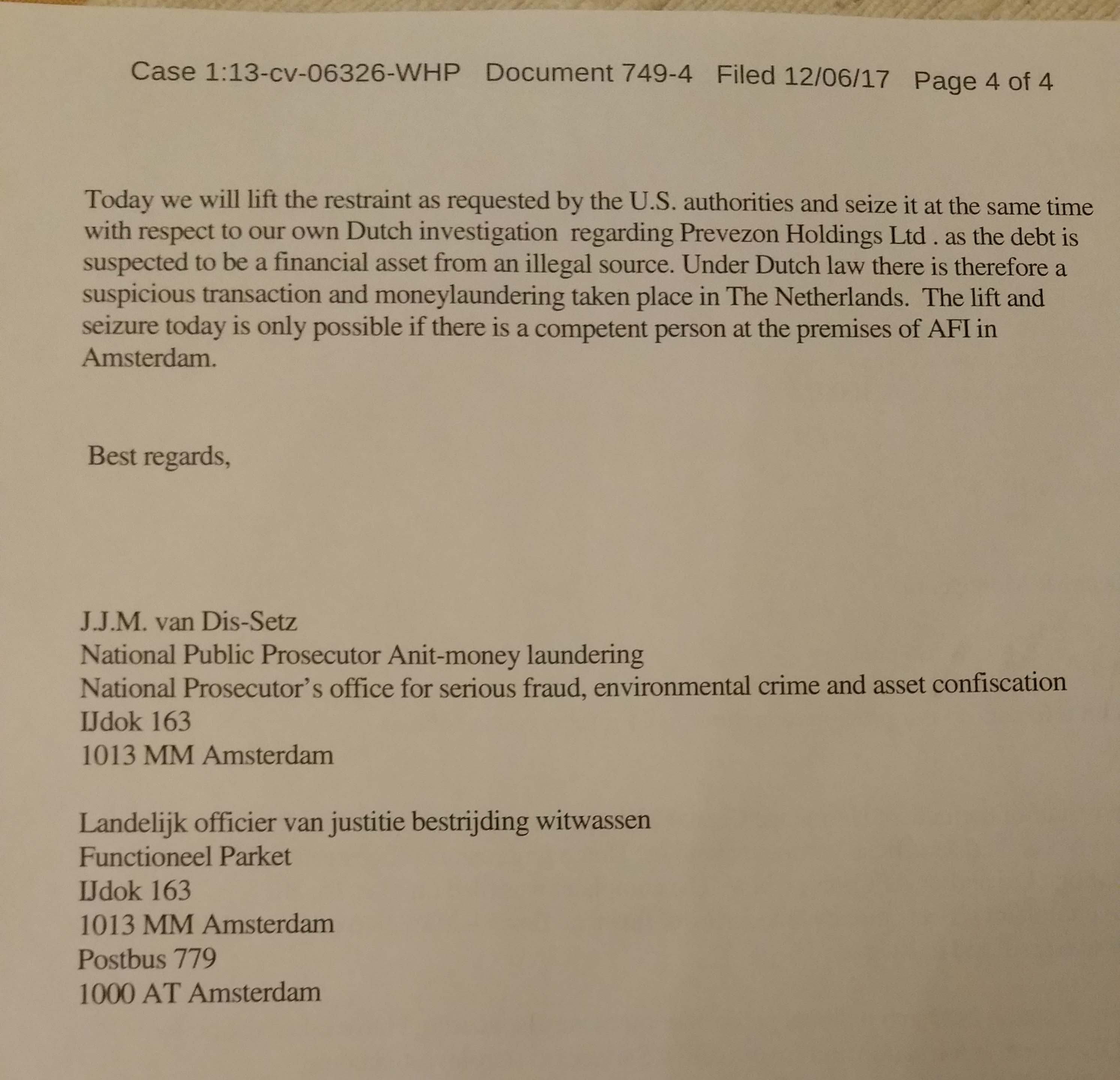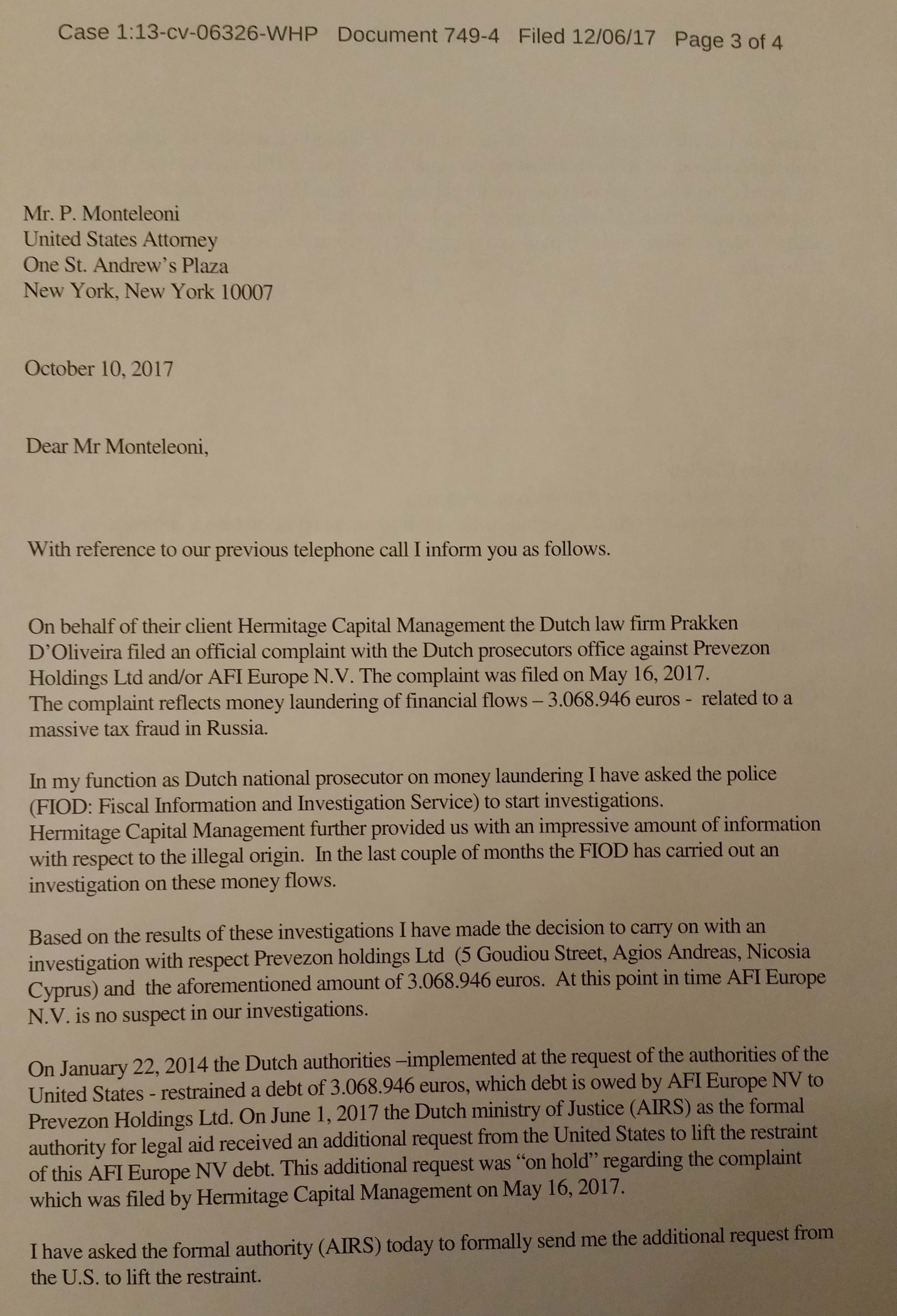By Lucy Komisar
New York, Dec 14, 2017 — Did the Justice Department collude with William Browder to block the settlement of a case which Browder got it to file to build a wall against Russian attempts to go after him for $70 million in back taxes and illicit returns from stock fraud?
Today at a federal court hearing in New York (Southern District of NY), a U.S. government attorney admitted that he had received information that the Dutch would block release of money that was supposed to settle a dispute between DOJ and the real estate holding company, Prevezon.
This is not just a minor civil case connected to a big-time convicted international tax evader. It about a major political/foreign policy operation promoted by interests who support hostility between the U.S. and Russia. Browder’s story is the basis for the U.S. Magnitsky Act sanctions against Russians. And for western law enforcement agencies such as Interpol to refuse to arrest him on Russian charges.
The money was supposed to pay for a $6 million settlement between the U.S. and Prevezon to end a case relating to the charge that Prevezon laundered $1.9 million of $230 million stolen from the Russian Treasury.
The Russians never asked for U.S. intervention, it brought its own case against the perpetrator, who got a jail term, but that is another story. The U.S. Justice Department brought this case because a politically-connected Browder asked for it. He met with Justice officials and supplied the documentation they used to file their case.
The alleged laundered amount was $1.9 million. The DOJ never ever brings cases for such small sums. It¢â‚¬™s considered chump change.
Finally, the DOJ and Prevezon settled for a $6 million payment of money (a debt owed to Prevezon) that the U.S. had gotten the Dutch to freeze. (The DOJ had frozen another $14 million elsewhere.) The U.S. asked the Dutch to release the debt. But curiously, the Dutch delayed until Browder could bring a case that would refreeze the money and prevent Prevezon from using it to pay the settlement.
For Browder, it appears vindictive, because he doesn’t benefit. He lost nothing in the tax refund fraud case, only the Russian Treasury lost. So, why would the U.S. and Dutch support this double dealing? This gets into the weeds. See the 100Reporters story for the details on how Browder has built an international political wall against Russia’s attempt to collect evaded taxes and illicit stock profits.
Today, in U.S. federal court in the Southern District of New York U.S. Attorney Paul Monteleoni admitted that the Dutch authorities knew months before the October 10, 2017 unfreezing of the accounts that Browder would bring the new suit. It would unfreeze the account at 1pm and refreeze it at 1pm.
This would have the effect of throwing a money-wrench into the settlement. But Monteleoni didn¢â‚¬™t tell the Prevezon attorneys when he learned this.
Did this failure to inform the opposition lawyer represent collusion or collaboration with Browder? Why would Monteleoni want to scupper the agreement? The Prevezon lawyers today (if you read the meaning of attorney Faith Gay’s polite statements) shouted fraud! Here is the Dutch letter.
 It tells Monteleoni that Browder filed a complaint against Prevezon May 16, 2017 charging it with money laundering. That is one day after Judge Pauley in New York approved the settlement order! A coincidence?
It tells Monteleoni that Browder filed a complaint against Prevezon May 16, 2017 charging it with money laundering. That is one day after Judge Pauley in New York approved the settlement order! A coincidence?
Ironically, Browder and his company were not victims of any money laundering or fraud. The Russian Tax Authority lost $230 million. So why would he have standing? Why would the Dutch, well known as facilitators of tax evasion (the ¢â‚¬Å“Dutch Sandwich¢â‚¬ ”), the very crime Browder was convicted of in Russia, take this case? What is going on here?
The Justice Department behavior has been suspicious from the beginning, since it filed a civil complaint against Prevezon and its owner, Denis Katsyv, which was based only on the report of the DOJ chief investigator, Todd Hyman who said he got all his evidence from Browder. And didn’t check it out. Asked in a deposition if he had contacted the banks through which the laundered money allegedly flowed, he explained he didn’t, because they were foreign banks. Really, asked the lawyer questioning him. Does your phone go long distance?
See video clip of Hyman’s deposition taken by lawyer John Moscow.
Background for those who don’t know: to get the whole story, look here. William Browder was convicted of tax evasion and in a sworn deposition in U.S. federal court, admitted to one of the Russian charges, that he had claimed he hired the disabled to get a tax break. Except that he didn’t hire anybody, his companies just held shares.
After that, some of his companies were used in the $230 million scam on the Russian Treasury, under which they were sued for the amount of the taxes they had paid, settled the suit, and applied for a $230 million tax refund. Browder said the companies had been stolen and others pulled the fraud. According to the man the Russians convicted, Browder’s accountant, Sergei Magnitsky, was involved.
So Browder got the Justice Department to charge a Russian, Denis Katsyv, whose father was a government railroad official, with laundering $1.9 million of the money.
The DOJ lawsuit went on from 2013 and was finally settled in 2017. Prevezon agreed in May to pay $6 million to get back the assets and stop money hemorrhaging for a trial. The money would come from the debt (money owed to Prevezon) in a Dutch contract, frozen by the Netherlands at the DOJ request. Prevezon in the agreement signed by both parties would use that money to pay $6 million to the DOJ.
But here is the scam. Which the Justice Department knew about months before. In documents cited today, the Dutch said today we will lift the restraint and seize it simultaneously!
What was going on? Monteleoni spent the whole time today arguing a lot of legal talk that to ¢â‚¬Å“release¢â‚¬ ” the money had nothing to do with to ¢â‚¬Å“return¢â‚¬ ” the money. But Prevezon lawyer Gay said, ¢â‚¬Å“At the same time we (the U.S.) asked them to release, we were helping them keep it.¢â‚¬ ”
According to Gay, only nine days after the settlement ¢â‚¬Å“our government began to work with the Dutch government on what would become complete frustration¢â‚¬ ” of the settlement, the key being the Dutch release of the frozen debt.
She said, ¢â‚¬Å“The government of the Netherlands told our government early on what it had done with U.S. knowledge.
She said months went on getting ready for the transfer. She said they held the request in abeyance till they could do it at the same time. Release and freeze.
¢â‚¬Å“Our government didn¢â‚¬™t say [to the Dutch] we have an agreement…..Did our government say we made a deal for release¢â‚¬ ” of the debt? There was an understanding by Prevezon that the debt would be released before the payment was due. And why didn¢â‚¬™t the DOJ tell the Prevezon lawyers four months earlier?
She accused the DOJ of ¢â‚¬Å“a serious question of good or bad faith.¢â‚¬ ” That appeared to be a subtle way of saying there was complicity, which Gay acknowledged to me afterwards she cannot say.
She said in court, ¢â‚¬Å“We¢â‚¬™d be entitled to discovery as to what our government work with the Netherlands was during this period.¢â‚¬ ” That means did the DOJ collude with the government on behalf of Browder?
This is part of the corrupt Browder v Prevezon case (sorry officially the U.S. v Prevezon, but really Browder v Prevezon) in which the DOJ is in effect acting as Browder¢â‚¬™s lawyer. Paid for by the Justice Department because it fits with the ColdWar 2.0 attack on the Russians.
I will post documents subsequently, but you can get them on Pacer, the federal court website, www.pacer.gov.
Case 1:13:-cv-06326-WHP Document 749-4 filed 12/06/17. Letter from Dutch Prosecutor to Monteleoni.
Also Case 1:13:-cv-06326-WHP Document 748.‚ And Case 1:13:-cv-06326-WHP Document 749.
Postscript: Look at this NY Daily News story about the hearing, which shows why the public is ignorant of this case. The headline highlights that the Russian lawyer of the DOJ target was listening in from Moscow on a conference call. Well, so what! It’s a common practice for foreign attorneys. Especially since the U.S. had refused to give her a visa to participate more effectively in defending her client in the U.S. court. The Daily News writer was so taken with the conference call that she managed not to mention what the hearing was about. Deliberate? Stupid? You decide. Haven’t seen stories on the hearing in the rest of the MSM. Shouldn’t the public know what the Justice Department did or didn’t do?
You didn’t read this in the MSM. And you won’t. Please donate to make such self-financed reporting possible!



Pingback: Lucy Komisar: Re: “Developments re Browder†– Johnson's Russia List
Pingback: Judge backs DOJ demand Prevezon pay $6 million tho it knew Browder would block assets to pay – The Komisar Scoop